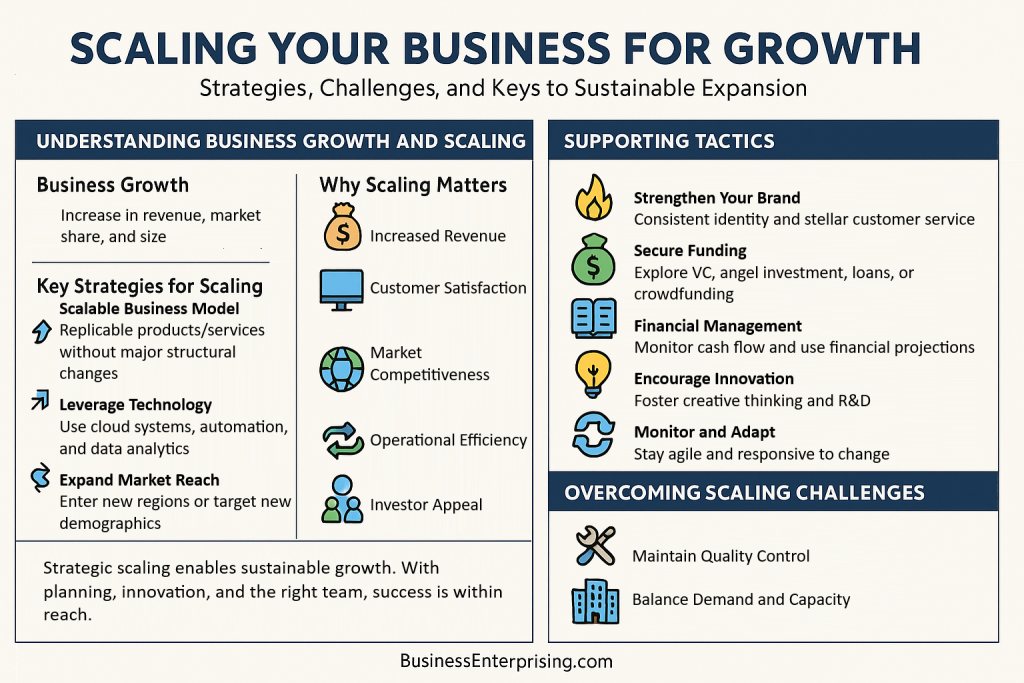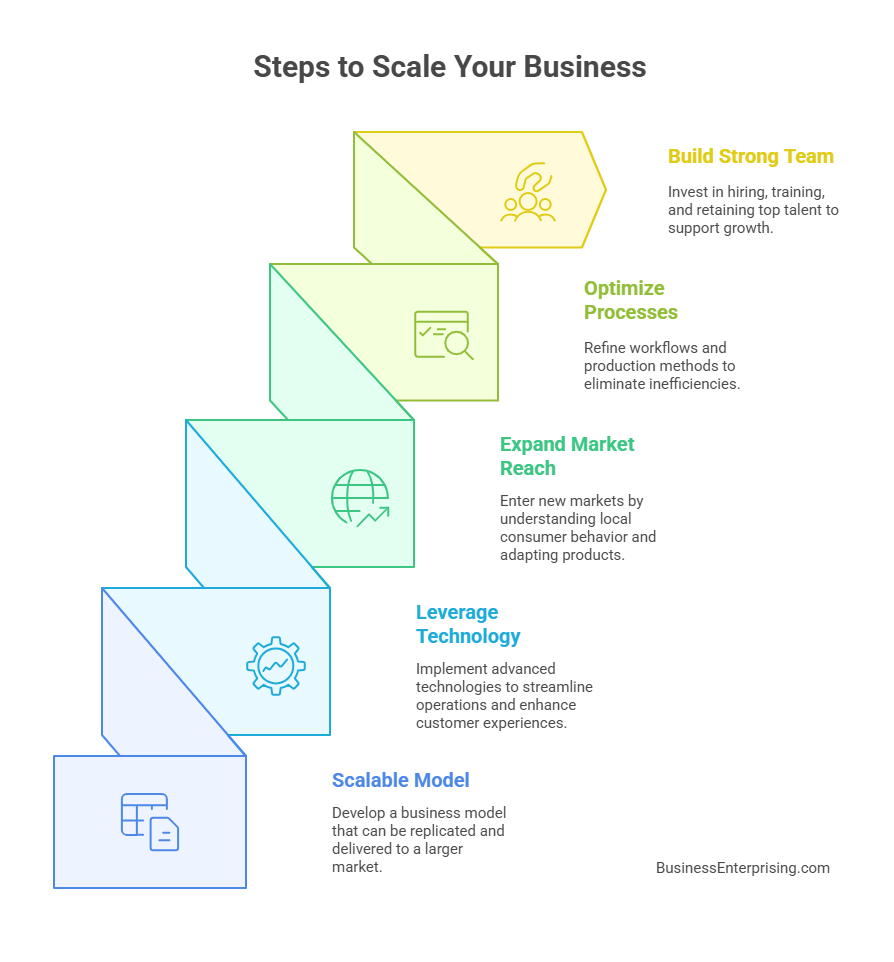
Understanding Business Growth and Scaling
Business growth refers to the increase in a company’s market share, revenue, and overall size. Scaling, on the other hand, involves expanding the business’s capacity to handle increased demand without compromising performance or quality. Scaling is about setting the stage to enable and support growth in a manner that your business can handle, and it involves growth management processes and structures.
The Importance of Scaling a Business
Scaling is crucial for several reasons, each contributing to long-term business success.
Increased Revenue: To begin with, effective scaling strategies can lead to substantial revenue growth. As operations expand, businesses are able to reach a broader customer base. Consequently, this growth in reach can drive higher sales volumes and, ultimately, increase overall profitability.
Market Competitiveness: Furthermore, scaling enables businesses to remain competitive within their industries. As other companies grow and introduce innovations, scaling ensures that your business can not only keep pace but also exceed industry standards and rising customer expectations.
Operational Efficiency: In addition, scaling typically involves the optimization of internal processes and systems. As a result, businesses experience improved operational efficiency, which can lead to cost savings, better productivity, and enhanced performance across departments.
Investment Attraction: Finally, a scalable business becomes more appealing to investors. When a company can demonstrate its potential for sustainable and profitable growth, it significantly increases its chances of securing outside funding and attracting investment opportunities.
Strategies for Growing a Business
Successfully building a business requires a comprehensive approach that includes planning, resource allocation, and execution. Here are several key strategies for scaling your company:
Develop a Scalable Business Model: A scalable business model is essential for sustainable growth. This means having a product or service that can be replicated and delivered to a larger market without significant changes to the business structure. Focus on creating value that can be easily scaled.
Leverage Technology: Technology is a critical enabler of scaling. Implementing advanced technologies such as cloud computing, automation, and data analytics can streamline operations, enhance customer experiences, and provide valuable insights for decision-making.
Expand Your Market Reach: Expanding into new markets, whether geographically or demographically, can drive growth. Conduct thorough market research to identify opportunities, understand local consumer behavior, and adapt your products or services to meet new market demands.
Optimize Processes and Operations: Efficient processes and operations are vital for scaling. Regularly review and refine your workflows, supply chain, and production methods to eliminate inefficiencies and improve scalability. Standardizing processes can help maintain quality and consistency as the business grows.
Build a Strong Team: A capable and motivated team is crucial for scaling. Invest in hiring, training, and retaining top talent. Ensure that your team is aligned with the company’s vision and goals, and empower them to take on leadership roles and responsibilities.
Scaling Strategies
Strengthen Your Brand: A strong brand can facilitate scaling by attracting new customers and retaining existing ones. Focus on building a consistent brand identity, delivering exceptional customer service, and creating a loyal customer base. Positive brand reputation can accelerate growth.
Secure Adequate Funding: Scaling often requires significant investment. Explore various funding options, such as venture capital, angel investors, loans, or crowdfunding. Having sufficient financial resources ensures that you can invest in necessary infrastructure, technology, and talent.
Implement Robust Financial Management: Effective financial management is crucial for scaling. Maintain accurate financial records, monitor cash flow, and develop detailed financial projections. Having a clear understanding of your financial health allows you to make informed decisions and avoid potential pitfalls.
Foster Innovation: Continuous innovation is key to staying relevant and competitive. Encourage a culture of innovation within your organization, invest in research and development, and be open to adopting new ideas and technologies. Innovation can drive growth and create new opportunities.
Monitor and Adapt: Scaling your business is an ongoing process that requires regular monitoring and adaptation. Continuously assess your growth strategies, market conditions, and internal performance. Be prepared to pivot or adjust your approach based on feedback and changing circumstances.
Overcoming Challenges in Scaling
Growing a business comes with its own set of challenges, including maintaining quality, managing increased demand, and preserving company culture. Here are some tips for overcoming these challenges:
Maintain Quality Control: As you scale, it’s crucial to maintain the quality of your products or services. Implement robust quality control measures and ensure that your team is committed to upholding high standards.
Balance Demand and Capacity: Scaling can lead to increased demand that may outstrip your capacity. Plan for capacity expansion in advance and invest in the necessary infrastructure and resources to meet growing demand.
Preserve Company Culture: Rapid growth can strain company culture. Make an effort to preserve the core values and mission of your business and ensure that new hires are a good cultural fit. Strong leadership and clear communication can help maintain a positive and cohesive work environment.
Manage Change Effectively: Lastly, scaling involves significant changes in processes, structures, and roles. Effective change management practices, including clear communication, employee involvement, and training, can help mitigate resistance and ensure a smooth transition.
Scaling a business is a complex but rewarding endeavor that requires strategic planning, resource management, and continuous innovation. By developing a scalable business model, leveraging technology, expanding market reach, optimizing operations, as well as building a strong team, businesses can navigate the challenges of scaling and achieve sustainable growth. While the journey may be fraught with obstacles, the potential rewards—enhanced revenue, market competitiveness, operational efficiency, and investment attraction—make it a worthwhile pursuit. With the right strategies and a proactive approach, entrepreneurs can successfully scale their businesses and achieve long-term success.


